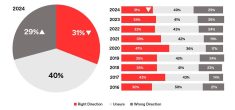Barry Dutka was tired in 2003 when he sold the Selkirk potato farm that had been in his family for more than 70 years and retired as a director with Peak of the Market.
But it wasn’t only a shortage of on-farm labour that prompted his departure from the industry. Dutka, 57, had had enough of fighting losing battles on behalf of small potato growers around the Peak of the Market board table.
“I was fed up,” he said. “I was fed up with the way the small guys were treated.”
Read Also

Mazergroup’s Bob Mazer dies
Mazergroup’s Bob Mazer, who helped grow his family’s company into a string of farm equipment dealerships and the main dealer for New Holland machinery in Saskatchewan and Manitoba, died July 6 from cancer.
Dutka says out loud what some Manitoba table potato growers say only in private.
SECRECY
To outsiders, Peak of the Market is a success story: a 68-year-old farmer-owned vegetable supplier which, according to its website, markets over 120 different varieties of Manitobagrown vegetables.
Peak is personified by its high-profile president and CEO Larry McIntosh, featured prominently in TV ads brandishing his trademark carrot microphone and encouraging people to eat their veggies.
But some farmers say there is another side to Peak. They allege the provincially regulated marketing board has an unspoken, long-term strategy to squeeze out small growers and concentrate the $33-million table potato industry in the hands of a few large commercial operations.
“Nobody has ever said, eliminate small growers,” said an inside source who spoke on condition of anonymity. “But their actions show it. There’s a master plan here. The master plan is for five growers.”
That’s hard to prove or disprove because Peak operates behind a veil of secrecy.
Its annual meetings are closed to the public. Statistics about the industry are kept under wraps. Names of registered growers and the sizes of their operations are not released. Only registered growers and their representatives are allowed to attend annual meetings. Annual reports are available just to members.
What’s really going on at Peak’s warehouse headquarters on King Edward Street in Winnipeg?
LIMITING THE MARKET
By changing regulations and adopting policies to make it harder for small growers, Peak gives the impression of a board with an agenda, said Ken McLean, a former Peak general manager and a predecessor to McIntosh.
“It looks very much, based on what they’re doing, that they are attempting to limit access to the table market to those who can fit into their rules. And they’re making those rules harder and harder to follow and more applicable to a smaller and smaller number of producers,” said McLean.
“There’s a lot of feeling that they’re a great big bully.”
– ERIN CRAMPTON
The industry is consolidating. Internal documents obtained by the Co-operator reveal:
Three large farms, all from the Winkler area, control more than half of Manitoba’s annual table potato quota (see sidebar).
The number of registered red potato growers shrank from 42 in 2002-03 to 22 in 2006-07 and to 13 in 2009-10. (A registered grower is one with 6,000 or more quota units. A 75-pound bag equals one unit.)
Eight of the 13 growers hold more than 25,000 bags’ worth of quota. Three hold less than 7,500 bags.
Peak says it serves 40 Manitoba farm families. However, only registered growers are allowed to attend annual meetings and vote. The 2008 annual meeting was attended by 34 people representing 18 registered producers, all but five of them from potato farms.
SMALL POTATOES
Those are commercial growers operating under quotas and regulations. There are also small, unregulated growers who sell privately to roadside stands and farmers’ markets. They, too, allege heavy-handed treatment, following a highly publicized incident last summer indicating a new aggressiveness by Peak in controlling unregulated sales.
Schreimer Family Farms of Otterburne was caught selling specialty potatoes directly to Sobeys supermarkets against the rules. (In an unrelated episode, Northern Potato Co. of Bagot was penalized for attempting an end run around the board by supplying potatoes directly to a Quebec fast-food chain.)
Had he not sold straight to Sobeys, Schreimer might not have been sanctioned. Previously, under its Vegetable Registration Order, the Farm Products Marketing Act defined a small potato grower as one who harvests four acres of land or less. Such producers were usually treated as exempt from the regulations. But recent regulatory changes eliminated the fouracre rule, as well as a definition for direct consumer sales.
Following the Schreimer incident, Peak announced it was developing new regulations to bring small growers under the board’s authority. The regulations are expected to take effect in time for spring planting.
During an October 13, 2009 radio phone-in show, McIntosh said Peak will still allow small growers to continue selling to farmers’ markets and roadside stands, as they have done in the past.
BIGGER DISPUTE
While small, unregistered growers garner media attention, a less-known and much larger dispute occurs below the radar. It’s between Peak and its own commercial growers.
Producers are retiring their quota and leaving the industry, alleging discrimination against smaller operations and favouritism for large ones.
Dutka cited a case in recent years in which a large, southern Manitoba potato farm was caught illegally using herbicides to artificially enhance the col-our of red potatoes. Although the required $10,000 penalty was paid, Dutka says it was recorded on the marketing board’s records as a donation, not as a fine. The affair was hushed up and he never did learn what happened to the potatoes.
Dutka believes the penalty would have been different for a small grower. “He would have had to destroy his whole crop. He would have been tied to the wall.”
In other examples, Peak doubled the minimum quota for new growers from 3,000 bags to 6,000 several years ago. This pressured some smaller producers to either double their storage or drop out and grow under the former fouracre allowance.
Peak in 2007 increased a producer’s maximum allowable quota from 60,000 bags to 100,000 bags.
QUOTA CHANGES
As well, Peak removed a penalty for overquota delivery several years ago. This resulted in significantly increased production by large growers. The board reintroduced the penalty in 2009 but grandfathered large growers with no penalty if they remained within their recent overquota sales. Small growers who focus on quota sales allege that large producers dump their grandfathered overages into that market, essentially shorting it for others.
In February 2009, Peak introduced a new $1,000 annual registration fee for each grower, regardless of size. Growers say it’s unfair for a 6,000-bag grower to pay the same fee as one producing 100,000 bags.
Some smaller growers, with only a few storage and separation bins, report paying the same annual on-farm food safety inspection audit fee as large producers with extensive facilities.
A number of growers have given up in frustration over measures they feel are stacked against them.
DISADVANTAGED
“You just know you’re basically being disadvantaged every step of the way,” said one.
But few are willing to speak on the record for fear of being penalized.
“I know if I were to speak up and my name were made public, they’d be right on me,” said a grower who did not want his name used.
The climate of fear is real, said Erin Crampton, a Winnipeg green grocer. It’s confirmed that Peak recently hired a compliance officer to inspect shipments, decide who’s bypassing Peak and pass the information on to the board.
“There have been numerous occasions of strong-arming by Peak and inspectors coming in. There’s a lot of feeling that they’re a great big bully when it comes to the potato-marketing side of it. They’re scared that Peak will retaliate further,” said Crampton.
ALLOCATION DISPUTE
Distribution of quota, which is legally owned by Peak, is another contentious point.
When producers leave the industry, they retire their right to use quota by selling it on a quota exchange. But 10 per cent of the sale goes into a pool for reallocation.
There are four candidates for reallocation: a registered producer under the 6,000-bag limit who wants to come up to at least that figure; a producer whose quota was cut for insufficient delivery and who wants to regain it; new growers entering the industry; other registered growers seeking allocation.
It’s the third category – new entrants – that causes controversy. Peak hasn’t reallocated quota to new growers for years, despite prodding from the Farm Products Marketing Council, the provincial regulator. Occasionally, new growers do emerge. But they usually buy farms and the accompanying quota.
Peak finally did announce a quota allocation to new growers in December 2009. Two successful individuals who meet the criteria will each receive 6,000 quota units – the minimum for a registered producer.
But there’s a catch: the quota is for lower-valued russet potatoes, not higher-value red potatoes (see sidebar).
Most russet growers also produce red potatoes to bring up their earnings. Industry sources say it is unlikely new growers could make money solely from russets.
“To simply allocate russet quota and expect a new grower to make money on russets alone without having some sales into the red market is very, very tough to do,” a grower said.
LAWSUIT
One producer is challenging Peak in court over its allocation practices. A lawsuit before the Manitoba Court of Queen’s Bench accuses Peak of “high-handed, outrageous, deliberate (and) callous” behaviour in preventing Kevin Pankratz of Steinbach from acquiring the farm and potato quota of another grower, according to court documents.
A 2008 statement of claim filed by Pankratz claims Peak in 2007 illegally blocked his acquisition of the farm and its red potato quota of 23,395 bags after initially agreeing to its transfer. (A statement of claim contains allegations which have not been proved in court.)
In a statement of defence, Peak says the land transfer was never completed and so the quota could not be reallocated.
The case is currently in an examination for discovery. Lawyers for both sides declined comment.
NOT AVAILABLE
Efforts by the Co-operator to interview Peak officials were unsuccessful.
McIntosh left a phone message after 5 p. m. Dec. 30 saying he was away and unavailable until late January. Ron Hemmersbach, vice-president of finance, said he could not comment. Emails and phone messages to Peak chairman Keith Kuhl, also president and CEO of Southern Manitoba Potato Co., went unanswered.
McLean said allegations about Peak “squeezing small guys out” are nothing new. That was the complaint in the 1980s when Peak shut down the potato-washing line at its warehouse, forcing growers to wash their own potatoes on-farm.
“There’s always been ghosts in the closet (about) an ulterior motive from as long as I was there,” said McLean.
That said, figures don’t lie. The fact remains that the number of growers has dropped sharply over the years, especially recently. The trend reflects a change in Peak’s attitude toward small-scale potato farming, McLean said.
“When I was there, we bent over backward to try and accommodate small producers. They did not want the perception out there that the big guys were squeezing the little guys.”
Bill Uruski, a former NDP agriculture minister, says the Farm Products Marketing Act was not meant to be applied in such a manner.
Even if Peak isn’t breaking the letter of the law, it’s violating the spirit by increasing quota maximums and concentrating table potato production in the hands of a few large growers, Uruski said.
“The minute you open that door, you’d better say that you’re going to have a heck of a lot less producers because those with the deepest pockets will be the ones who will grow incrementally. It’ll be easier for them to essentially gobble up those who are smaller.”
McLean acknowledged some would argue the number of farmers doesn’t matter – only production and profitability do.
But by cracking down on roadside stands and implementing policies against small producers, Peak is taking the industry in a direction it was never intended to go, he said.
“In my opinion, that’s wrong.”
Most russet growers also produce red potatoes to bring up their earnings. Industry sources say it is unlikely new growers could make money solely from russets.
“To simply allocate russet quota and expect a new grower to make money on russets alone without having some sales into the red market is very, very tough to do,” a grower said.
LAWSUIT
One producer is challenging Peak in court over its allocation practices. A lawsuit before the Manitoba Court of Queen’s Bench accuses Peak of “high-handed, outrageous, deliberate (and) callous” behaviour in preventing Kevin Pankratz of Steinbach from acquiring the farm and potato quota of another grower, according to court documents.
A 2008 statement of claim filed by Pankratz claims Peak in 2007 illegally blocked his acquisition of the farm and its red potato quota of 23,395 bags after initially agreeing to its transfer. (A statement of claim contains allegations which have not been proved in court.)
In a statement of defence, Peak says the land transfer was never completed and so the quota could not be reallocated.
The case is currently in an examination for discovery. Lawyers for both sides declined comment.
NOT AVAILABLE
Efforts by the Co-operator to interview Peak officials were unsuccessful.
McIntosh left a phone message after 5 p. m. Dec. 30 saying he was away and unavailable until late January. Ron Hemmersbach, vice-president of finance, said he could not comment. Emails and phone messages to Peak chairman Keith Kuhl, also president and CEO of Southern Manitoba Potato Co., went unanswered.
McLean said allegations about Peak “squeezing small guys out” are nothing new. That was the complaint in the 1980s when Peak shut down the potato-washing line at its warehouse, forcing growers to wash their own potatoes on-farm.
“There’s always been ghosts in the closet (about) an ulterior motive from as long as I was there,” said McLean.
That said, figures don’t lie. The fact remains that the number of growers has dropped sharply over the years, especially recently. The trend reflects a change in Peak’s attitude toward small-scale potato farming, McLean said.
“When I was there, we bent over backward to try and accommodate small producers. They did not want the perception out there that the big guys were squeezing the little guys.”
Bill Uruski, a former NDP agriculture minister, says the Farm Products Marketing Act was not meant to be applied in such a manner.
Even if Peak isn’t breaking the letter of the law, it’s violating the spirit by increasing quota maximums and concentrating table potato production in the hands of a few large growers, Uruski said.
“The minute you open that door, you’d better say that you’re going to have a heck of a lot less producers because those with the deepest pockets will be the ones who will grow incrementally. It’ll be easier for them to essentially gobble up those who are smaller.”
McLean acknowledged some would argue the number of farmers doesn’t matter – only production and profitability do.
But by cracking down on roadside stands and implementing policies against small producers, Peak is taking the industry in a direction it was never intended to go, he said.
“In my opinion, that’s wrong.” [email protected]


















